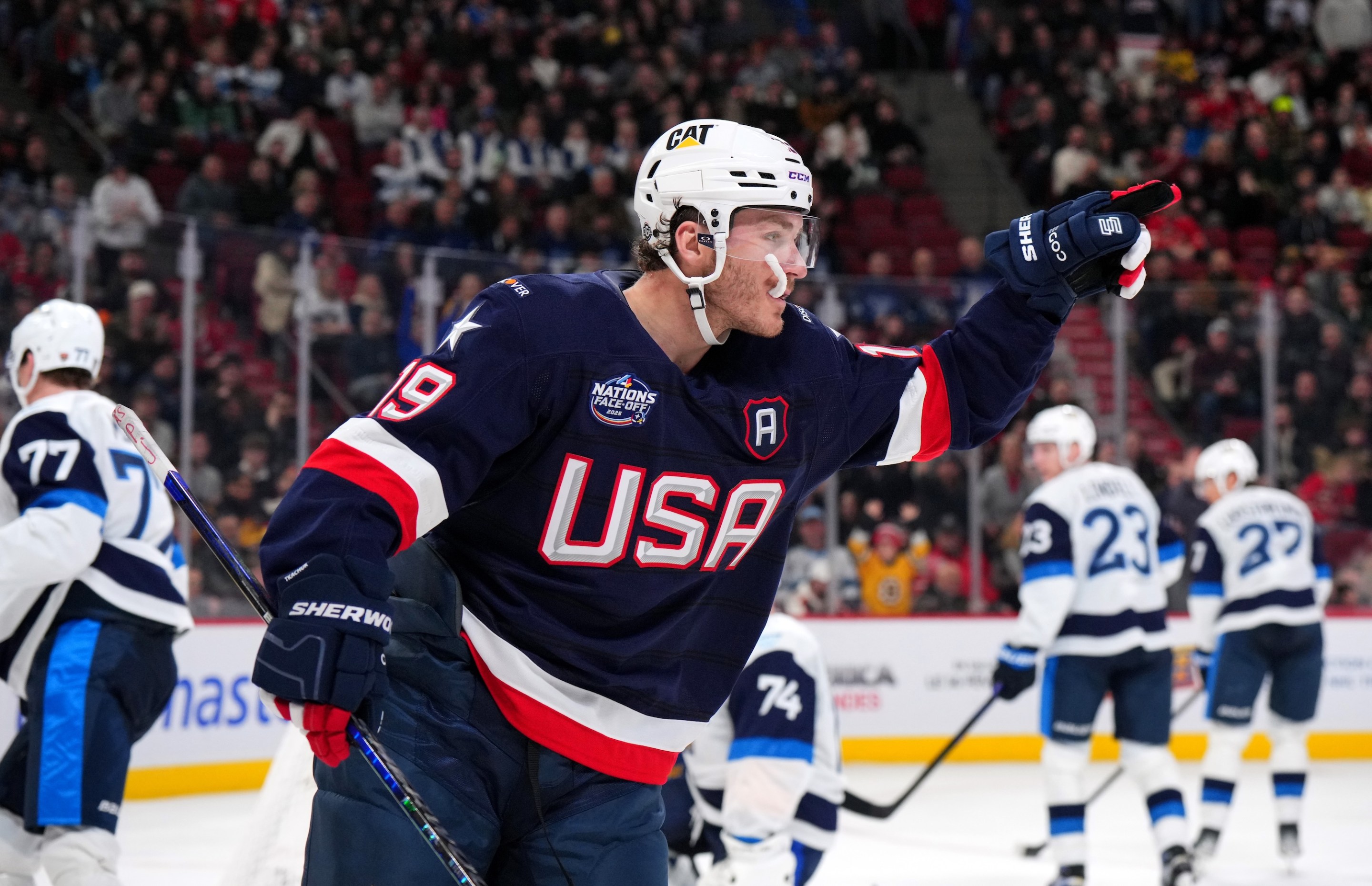The United States in 2025 may not be among the world leaders in human rights. Or democracy. Or education. Or healthcare, press freedom, income equality, environmental protection, political transparency, child and maternal mortality, or life expectancy. But no one can say we don't have one hell of a hockey team. USA! USA! USA!
Just how good this Team USA is, heralded as perhaps the best roster the country has ever iced, is still to be determined, even after a 6-1 shellacking of Finland in Montreal on Thursday night that served as both a barometer and a warm-up for Saturday's throwdown with Team Canada. Business was taken care of against the overmatched Finns, even if it took a little while to transact. "We either win or we learn," said Finland captain Aleksander Barkov. "We learned a lot."
Just as interesting is what type of team we've got on our hands here. Three of the nations, uh, facing off in the stupidly but accurately named 4 Nations Face-Off have pretty clear national identities, and have for a while. Canada has a ridiculous amount of offensive firepower and big questions in net. Sweden is fast and boasts the tournament's best blue line. Finland, despite a shorthanded defensive corps, will always punch above their weight, and always make opponents' life difficult with forwards who battle for every puck in every zone.
The Americans? Well, it's not quite clear yet, though it's a good problem to have. This is maybe the deepest and most well-rounded roster, without any obvious weak points, but also without boasting the tournament's best unit anywhere save goaltending. It's a good mix of skill and toughness and the capability to play any kind of game. I was curious, going into Thursday night, whether they would have the confidence to impose their chosen game script on their opponent, or if they would engage in the scrap-fest the Finns preferred. For 40 minutes, that's exactly what happened—but the U.S. likes a tussle, too. And in the last 20, they showed what they're capable of when the ice opens up.
Finland drew first blood, with a characteristically messy counterattack that saw two defensemen join the rush and Henri Jokiharju scoring on a deflection on a shaky-looking Connor Hellebuyck, drawing cheers from the pro-Finland (or rather, anti-U.S.) Canadian crowd. But the Americans answered right back with a gutty goal created by the forecheck. Matt Boldy pushed a Finn off the puck, allowing Zach Werenski to keep it in the offensive zone. Boldy then recovered and fired a nice centering pass to Brady Tkachuk, who cleaned up his own rebound on Juuse Saros's doorstep
The goal was a fine microcosm for Team USA's play through the first two periods of this game, and also a possible blueprint for how to find success against Canada. They were finishing every check, challenging every puck, creating messes in front of the net. This is the Finns' game too, but by necessity. For the Americans, it's one of their strengths. "That's the way we [Tkachuks] play, one of the reasons why we're on the team," said older brother Matthew Tkachuk. "You don't change your game. You play your identity."
The U.S. finally took the lead with three minutes remaining in the second, on Matt Boldy's tip-in of Wild teammate Brock Faber's shot, but it was still a little close for comfort, and the U.S. weren't exactly creating a lot of great opportunities on 5-on-5. So head coach Mike Sullivan shook up his lines a little bit, putting the Tkachuks on either side of Jack Eichel. It paid immediate dividends. Matthew Tkachuk scored on the power play early in the third, and then Jake Guentzel made it 4-1 just 11 seconds later, on the first Team USA goal that came on any sort of rush.
The skill of the U.S. skaters began to win out against a weary Finnish defense, and Brady Tkachuk promptly scored his second goal on a nifty move.
Those three goals in the three minutes to open the third period functionally decided things, and Matthew Tkachuk would match his brother with his second of the game to make it a six-spot. The Tkachuk-bookended line proved a nightmare for Finland, and if nothing else comes from this first game besides making that line permanent, that's still significant. "It’s annoying to face one of them in the NHL at once,” Werenski said. “I can’t imagine both of them.”
The Guentzel-Matthews-Hughes line was also flying, and if the U.S. can't quite match Canada's top-six star power, they've got to like their chances in a more deliberate, physical game, and be confident in the two-way play of their depth guys. Saturday's game, more a clash of styles than this one, should be easier to read: Canada's thoroughbreds want a fast, north-south affair. The U.S. will seek to hobble those horses. With this tournament using the 3-2-1-0 point system and Canada needing overtime in their first game, Team USA is in pole position.






